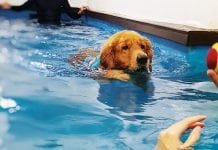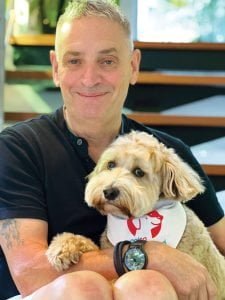 “It was 2016 and a normal weekend in Melbourne when my wife Fiona announced that she wanted to make a cheesecake. We jumped in the car to head to the shops, but little did she know I had a hidden agenda. I’d always loved dogs and had been badgering Fiona to get one for years with no joy. However, I’d been doing some sneaky research on breeds that were hypoallergenic and didn’t shed, and I had a proposition for her.
“It was 2016 and a normal weekend in Melbourne when my wife Fiona announced that she wanted to make a cheesecake. We jumped in the car to head to the shops, but little did she know I had a hidden agenda. I’d always loved dogs and had been badgering Fiona to get one for years with no joy. However, I’d been doing some sneaky research on breeds that were hypoallergenic and didn’t shed, and I had a proposition for her.
Fiona didn’t question it when I suggested we visit a slightly different supermarket – one that took us past a pet shop – and thankfully, the puppy I’d spotted a few days previously was still there. Only three-months old, with rusty orange fur and white stripes, was half-poodle-half-schnauzer (Schnoodle), Bentley. Just as he had done before, he extracted himself from his two sisters and made a beeline for me, snuggling up to my ankles and jumping on my lap. He came home with us that day (along with the ingredients for the cheesecake!).
Positives of pets
We didn’t want him to run wild so we sent Bentley for professional training at The Alpha Canine Group (thealphacaninegroup.com.au). The staff pointed out that with his gentle temperament and love of people, Bentley would make a great therapy dog: a pet who can help soothe, regulate, and provide relief and stability to humans in need of support.
I didn’t have to think twice. Back in Melbourne I was a member of the Australian Army for 35 years, retiring as a Warrant Officer Class One. My last posting was as a Career Manager, managing the careers of over 2,000 soldiers which I loved. In this role I’d had many conversations with soldiers about their mental health, and as I was myself diagnosed with Post Traumatic Stress Disorder (PTSD) a couple of years after returning from Afghanistan in 2010, I was aware of the positives of pet ownership. Fiona and I loved the idea that Bentley might be able to help others, so we signed him up for both therapy dog and service dog training straight away.
To make the grade, Bentley and I both had to go through some tests together. As part of Responsible Pet Ownership, an initiative run by the Victoria government, we were monitored by officials. They looked at how we interacted together; Bentley’s behaviour around other dogs, people, and those in wheelchairs; and how he reacted to loud noises and crowds. I did give him a bit of a pep talk beforehand! Eighteen months later, we officially started to go out with Responsible Pet Ownership to offer therapy dog and support dog services to schools and kindies in the area. In addition, Bentley received the same status as a guide dog for the blind.
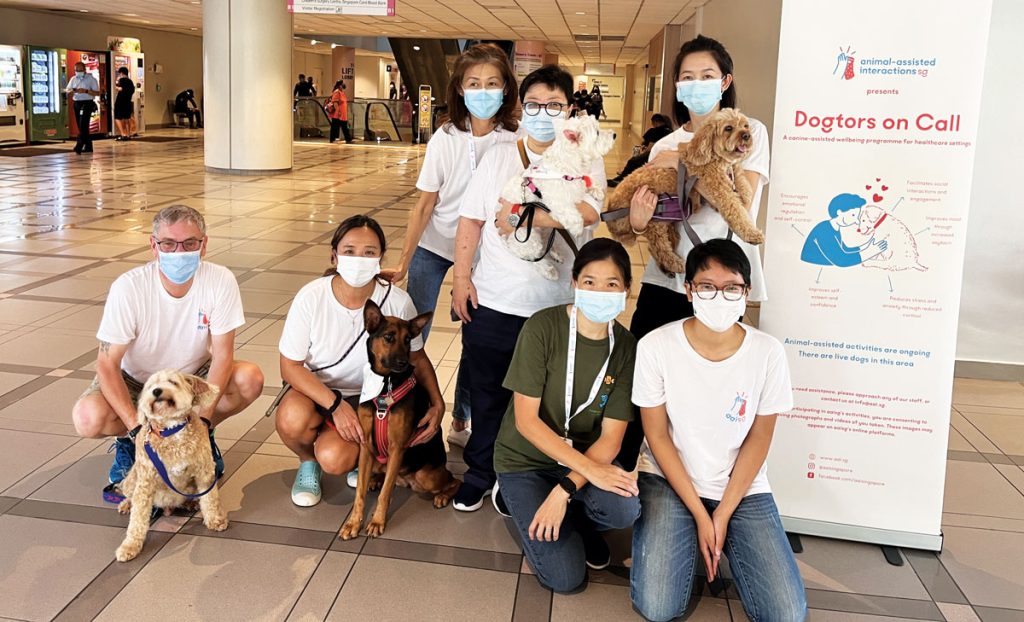
Play & cuddles
Initially, we’d stop by for 40-minutes to an hour. Sessions were carried out by the teachers and myself, and were all about meeting Bentley, feeling safe around a dog, knowing how to behave around a dog and – of course – it was a chance for the kids to play and get a cuddle from Bentley. We also visited the dementia ward of an old people’s home – it was pretty hard stopping the residents from giving him chocolate! As he’s such a chilled out dog it was always so much fun. I never had to worry about Bentley misbehaving and I can tell when he gets tired as he just lays down very still.
When Fiona and I moved to Singapore, there was no question that Bentley and his baby brother Watson would come with us. The dogs actually adapted to expat life much better than I did, especially as we arrived during the pandemic and the transition was tough. On difficult days I’d be dragged out of the house on walks where I’d be forced to explore my new surroundings and chat to other dog owners. I wouldn’t have managed the move without our pets.
“Somehow Bentley just knows who needs the extra love”
I first met Adele and Stasha from Animal Assisted Interactions Singapore (AAISG), a social enterprise specialising in animal-assisted interactions and interventions, at a Pet’s Day Out event in Bishan in 2022. When I explained the community work I was doing back in Australia with Bentley, they were fascinated and keen to find out more. Now we work together to bring the same therapy dog training and consequent support for the community to Singapore. Today AAISG runs a preparatory course and a 10-hour mentorship programme to accredit dogs and their handlers as “Caring Canine Teams”. We have about 20 teams with dogs of all breeds, shapes and sizes.
Places we’ve visited on the AAISG-designed programmes include a senior centre in the East, The National University of Singapore, Nexus International School, Bukit Batok Polyclinic, Singapore General Hospital and Sengkang General Hospital. It’s so rewarding to witness the comfort that Bentley brings, but it can also be very emotional. Sometimes he will single out a child or adult and try to snuggle up to them – somehow he just knows who needs the extra love.
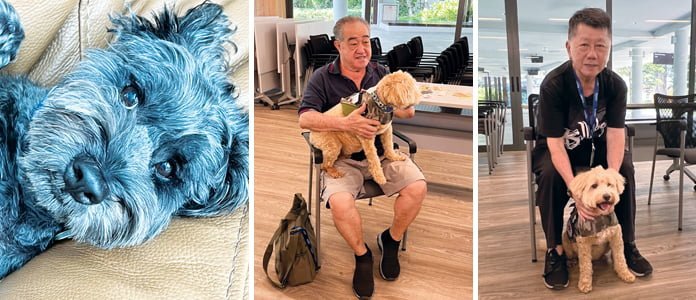
Time & education
While AAISG (aai.sg) take dogs into the community to provide the same care to those in need as back in Oz, therapy dogs and service dogs are sadly not officially recognised here. Efforts are being made to address this, but for now it’s believed that there are less than five guide dogs for the blind in Singapore. For this reason, I sometimes have difficulty going to certain places around the island with Bentley in tow, which can be frustrating. Hopefully, time and education will bring about change.
I didn’t initially get Bentley as a pet to assist with my PTSD, but his presence has been invaluable. From the day we brought him home, I noticed an instant difference in my physiology. He instinctively knows when I’m going to get stressed before I do, helps me to relax, and he’s the perfect model for my side-business making doggy clothing (barkberrymanor.com.au). Apart from when he went through a phase of stealing socks, he’s brought nothing but joy and happiness to my life. I would be lost without him.”
Therapy Dog v Service Dog
- A therapy dog is trained to provide comfort and affection to people in schools, hospices, disaster areas, retirement homes, hospitals, nursing homes, and more
- A service dog is certified and trained to help people with disabilities, such as visual impairments, mental illnesses, seizure disorders, diabetes, and so on
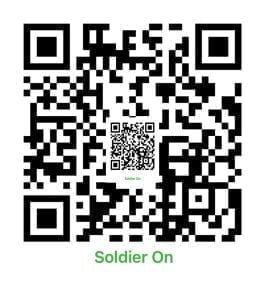 Show Support
Show Support
Mark and Bentley are participating in the March On fundraiser, an initiative by Soldier On to raise awareness to prevent veteran suicide. The aim is to complete 96km – half the length of the Kokoda track – however, they are aiming to do 500km by 31 March and to raise $5,000. To support the cause, log onto marchonchallenge.org.au/fundraisers/markgreaves



 “Somehow Bentley just knows who needs the extra love”
“Somehow Bentley just knows who needs the extra love”